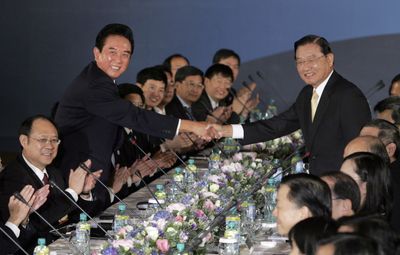China, Taiwan sign accords
Air space, shipping lanes expanded

BEIJING – China and Taiwan agreed Tuesday to expand direct flights and broaden shipping and mail services in multibillion-dollar moves that will boost trade and tourism across the troubled Taiwan Strait and ease six decades of hostilities.
The landmark signing ceremony, televised live on both sides of the Strait, brought a dramatic thaw in tensions but sidestepped prickly issues of sovereignty.
Chen Yunlin, the most senior representative from Beijing to visit the island of Taiwan in 60 years, signed four accords with his Taiwanese counterpart, Chiang Ping-kung, and agreed to high-level talks every six months, alternating between Taipei and Beijing.
The accords mark a broad expansion of direct links across the Taiwan Strait, one of the major flashpoints in Asia.
China has long regarded Taiwan as a renegade province, and reserves the right to reunify by force if necessary. The two sides split amid the bloody civil war that ended in 1949.
Beijing and Taipei will triple the number of direct weekly flights from 36 to 108, and allow them to fly from 21 cities, up from five. Airliners no longer will have to veer south through Hong Kong airspace, which will shave hours off cross-Strait trips. Traveling between Taipei and Beijing would take only two hours, and between Taipei and Shanghai about 80 minutes.
Taipei and Beijing also agreed to open direct shipping links between 63 Chinese ports and 11 Taiwanese ports, and to begin direct mail services, including parcel deliveries, express mail and postal remittances.
A fourth accord calls for the two sides to exchange food safety updates and establish a mechanism to deal with major food safety incidents.
Early next year, talks will be held on joint criminal law enforcement, more food safety cooperation and financial ties that would allow Taiwanese banks to buy directly into banks or security brokerages on the mainland.
Upon coming to power in May, Taiwan President Ma Ying-jeou moved to improve ties with Beijing and end decades of rivalry, paving the way for talks in Beijing in June that were the first in about a decade.
Ma has since lost popularity and faces growing pressure from the main opposition, the Democratic Progressive party, or DPP, which seeks Taiwan’s formal independence from China. Chen’s visit to Taipei led to widespread protests among DPP supporters.